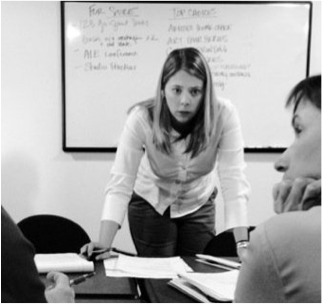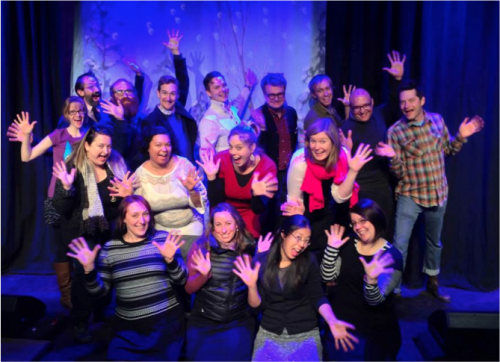I have come to realize that a huge part of my fellowship is about reflecting on the last ten years of work at Springboard for the Arts and thinking and exploring what might be next. So, as I celebrated my official 10 year “workaversery” I took some time to reflect on what I think I’ve learned from the opportunity to do this work for a decade.
10 Lessons From 10 years at Springboard
Holy buckets. I’ve been at Springboard for the Arts for 10 years this week. I still remember the feeling of sitting at my desk on my first day and not having the foggiest idea what to do or what I had gotten myself in to. I looked like this:

(actual photo from my first week at Springboard by Scott Streble.)
Terrified. Definitely a fake-it-until-you-make-it moment. And, now, well, I still don’t know what I’m doing a lot of the time. I have felt my way along, had incredible mentors and colleagues and friends, and I have learned so much. I’ve learned enough that now I get invited to bore grad students with my opinion and thoughts on leadership and nonprofits and I say things like “the sector” and “the field.” One thing I’ve learned is that writing helps me process and clarify things I’ve learned. And, so, here are 10 things I’ve learned in the last 10 years.
- Be valuable. It’s not a financial crisis. It’s a relevance crisis. Dig deeper than a new marketing plan or even a new strategic plan. Put everything on the table and ask “if we recreated this organization today, what would it look like? How are we engaged in the most relevant issues facing our community? How are we demonstrating tangible value to our constituents?” Build useful, relevant programs that people value and then keep doing that. (Also, take a class at Nonprofits Assistance Fund so you can understand financials.)
- Operate from abundance. Scarcity doesn’t feed you. Figure out what you can offer, maybe it’s money, or time, or space, or partnership or creative thinking and then offer it. Say yes to everything for a while until you learn more about what you should say yes to. Even then, make sure your “reckless yeses” outweigh your “prudent nos.” Share what you’ve learned as freely as you can.
- Organize around people’s passion & ideas. People don’t change. People can (and should!) learn new skills, but their fundamental personalities and proclivities don’t change. You’ll be super frustrated if you expect or try to force them to change. So hire awesome people who care deeply about the work, and then let them do awesome things. Support new ideas that get people excited. Let go of ideas that don’t have a champion…even if you think they are great (unless you’re willing to do them yourself.)
- Humans are human. Humans are not robots, they are human. Humans are messy and weird and surprising and awesome. People have a lot of other stuff going on in their lives. They also have emotions and baggage and passions. Try to create a place where people can bring their whole selves to their job and a place that understands when family, artistic or personal priorities need to come first. Try to have grace and patience for your colleagues, and hopefully they’ll have grace and patience with you.
- Let collaborators change you. Work with people you love. Learn the languages of other sectors and fields, listen to their challenges and opportunities, try to see their perspective on the work. Find partners who will ask hard questions and challenge you to see things differently. Be responsive and flexible. What if we aspire to mission growth, rather than fear mission creep?
- Know your principles. What are the things you’re willing to go to the mat for every. single. time.? What are your deal breakers, your must-haves, your non-negotiables? Write them down and then be confident that you can let those fantastic collaborators change you and push you, because you know who you are. “Tight on the mission, loose on the method” as Erik Takeshita says.
- Show up. I’m pretty introverted, so at the beginning I really had to force myself to go to events, conferences and other gatherings. I learned that it’s so important. Building a network of colleagues outside of your organization, your field and your sector can bring all kinds of energizing collaborations, ideas and knowledge to your work. It also shows people you’re invested in their work and ideas. Go to things outside of your comfort zone, learn about other people’s passions, see your role in a larger context, and make new friends. Ask people you admire to have coffee. Go to coffee when other people ask you—yes, you’re busy, but the relationships are the work.
- Beware best practices. Sometimes it’s better not to know the right way to do something. Sometimes you come up with a better way. Or at least you learn something. Nonprofits are filled with have-to-haves. Board committees, employee time tracking, dedicated development staff, an annual gala, a fundraising board, an endowment, doors on my office…I could make a very long list of things that someone else has told me we “need to have” that it turns out we didn’t. The infrastructure and policies of the organization are the tools for enacting your mission, so they should support and enable the culture, values and pace of the work you want to make.
- Embrace the creative process. For everything. Find the right collaborators, put people around the table, ask questions, rehearse, iterate, fix, try again, look at it upside down, iterate, iterate, iterate. Also, fun…have lots of it.
- Do. Do something! Do it now. Figure out how to break off a small manageable chunk and try it. Don’t wait around for permission or funding or the perfect plan. Start small and try it out. A pilot or prototype will give you so much more information than a plan ever will. And a successful pilot will help you raise support, rally partners and gather the resources necessary to take that prototype and make it bigger. The show doesn’t go on because it’s ready; it goes on because it’s eleven-thirty. -Lorne Michaels
Thanks, Springboard for the Arts, for 10 amazing years. I found my purpose, my work, my identity in these last 10 years. I’m so proud of what we’ve accomplished and so excited and challenged by all we still need and want to do. And most importantly, I have gotten to work with some of the most amazing, surprising, weird and awesome humans in the world:

(Springboard staff and board this year. So many more jazz hands 10 years later.)